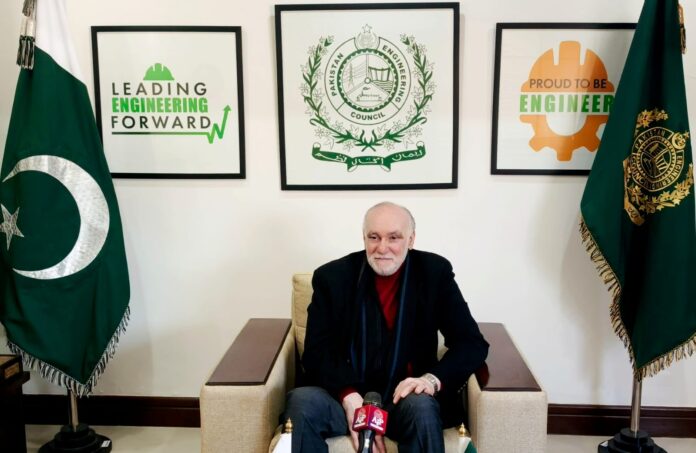By Adnan Rafique
ISLAMABAD: As Pakistan moves towards a rapidly evolving technological landscape, the Pakistan Engineering Council (PEC) is spearheading efforts to modernize engineering education, enhance professional standards, and equip engineers with globally competitive skills.
In an exclusive interview with the APP, PEC Chairman, Engineer Waseem Nazir shared his vision for the future of engineering in Pakistan. With the Council set to mark its 50th anniversary next year, he emphasized the need for policy reforms, technological adaptation, and skill development to keep pace with global advancements.
“The world has changed dramatically, and policies that worked even two years ago may no longer be relevant today,” he noted. “Artificial intelligence, digital media, and an abundance of knowledge present new challenges, and our priority is to harness these advancements to empower engineers and strengthen Pakistan’s engineering sector.”
Nazir, who took charge four months ago, outlined his agenda for transforming PEC into a forward-looking, globally competitive institution. From improving professional ethics to reforming engineering education and facilitating international job opportunities, PEC is actively working to ensure that Pakistani engineers are recognized and valued worldwide.
He highlighted that PEC serves as a regulatory body, overseeing engineers in academia, construction, operations, and consultancy. Engineers have to register with PEC to practice which ensures they receive the necessary training and meet professional standards.
Additionally, PEC plays a crucial advisory role for the government, acting as a think tank on engineering-related issues.
Reflecting on PEC’s journey, Nazir noted its growth from a small office to an organization dealing with over 450,000 engineers.
He stressed that PEC is committed to adapting its policies to the changing world and ensuring the profession gets
His first priority upon taking charge was to modernize PEC’s operations, aligning them with the demands of the 21st century.
He emphasized that ethics and values must guide the use of knowledge, as technological advancements alone are not enough to drive meaningful progress.
The chairman also stressed the need to enhance the respect and recognition of engineers in society. “Every structure we see-the buildings we work in, the cars we drive-exists because of engineers. Their contributions should be acknowledged, and their professional standing must be elevated,” he said.
To achieve this, PEC is working to improve the quality of engineering education by updating university curricula to meet international standards. Efforts are also being made to facilitate ease of doing business for contractors and consultants.
Nazir pointed out that many Pakistani engineers working abroad are forced into unrelated jobs due to a lack of globally competitive skills. “If our engineers move abroad, they should contribute to innovation rather than taking up odd jobs. We must ensure that they are well-prepared for international markets,” he emphasized.
Addressing concerns over brain drain, he stated that in a globalized world, skilled professionals will naturally seek better opportunities. However, Pakistan must focus on producing high-quality engineers who can contribute both domestically and internationally. To tackle unemployment, PEC has launched 78 new initiatives in the past three months, with many already showing positive results. Nazir has also engaged with contractors across all provinces to understand their challenges and implement effective solutions.
He underscored Pakistan’s membership in the Washington Accord, which enables local engineers to work internationally. Maintaining high professional standards is essential to ensuring Pakistani engineers remain competitive in the global market. PEC is actively working on curriculum revisions to align engineering education with international requirements.
One of PEC’s flagship initiatives is the Pathway to Practice program, designed to ensure engineering students begin their professional registration from the first day of graduation.
Additionally, PEC is establishing PEC Desks at various universities to assist graduates in obtaining their engineering titles. “So far, 30 universities have approached PEC to implement this facility, which will streamline the registration process and enhance career prospects,” Nazir revealed.
PEC has also taken a major step in preparing engineers for emerging technologies. The Council has launched a three-year initiative to train 45,000 engineers in Generative AI, with 5,000 engineers already certified by Silicon Valley experts. “We are now preparing for the next batch of this program,” he added.
Another key priority is the development of engineering codes and standards to bring Pakistan’s regulatory framework in line with international benchmarks. PEC has formed a dedicated committee to develop building, energy, and health & safety codes, with several already finalized. Implementing these codes will be crucial in ensuring safety, resilience, and quality in engineering projects, he said.
Nazir also emphasized the importance of bridging the gap between engineers, technologists, and technicians, as all three tiers are essential for development. “If there is a gap, quality will be compromised, and the end product will suffer. PEC is working to create better coordination among these professions to enhance overall engineering output,” he stated.
Looking ahead, Nazir expressed his ambition to make PEC one of Pakistan’s leading institutions by introducing ISO certification, improving governance, enhancing customer service, and promoting corporate social responsibility.
He stressed that “Leading Engineers Forward” is not just a slogan displayed at PEC headquarters, but a mission guiding all initiatives.
To address regional disparities in education, PEC is collaborating with universities in Balochistan, Interior Sindh, and Khyber Pakhtunkhwa to uplift engineering standards. The Council has also organized workshops for contractors and consultants to enhance their expertise. “I want to see Pakistani engineers working across the globe and our universities ranked among the world’s best,” he stated.
Setting a long-term vision, Nazir outlined PEC’s roadmap leading up to 2030, with multiple strategic targets aimed at upgrading Pakistan’s engineering sector. “Engineering is a noble profession that serves humanity. Our goal is to facilitate society by producing top-tier engineers who can drive national progress,” he concluded.
With a clear focus on modernization, international competitiveness, and professional development, PEC under Engineer Waseem Nazir’s leadership is paving the way for a new era in Pakistan’s engineering sector.
Through strategic reforms and forward-thinking initiatives, the Council aims to strengthen engineering education, empower professionals, and enhance Pakistan’s global standing in the field of engineering.




